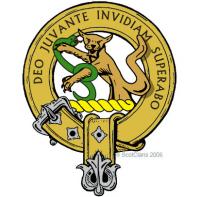
Clan MacThomas
The Clan originated in the 15th Century when Thomas, a descendant of the Chattan Macintoshes, grandson of William, 8th. Chief of Clan Chattan . The Clan had become too large to manage so Thomas took his kinsmen across the Grampians from Badenoch to settle in Glenshee. They were known as McCommie, McColm and MacComas.
Clan MacThomas takes it’s name from Thomas which in Gaelic is Tomaidh Mor (Big Tommy). The Government in Edinburgh assigned them the name MacThomas, there is eviden ce in the Roll of the Clans in the Acts of the Scottish Parliament in 1587 and 1592. To this day MacThomas remains the official name of the Clan.
In the early begins of the clan the first chiefs settled at a place called Thom in the east bank of the Shee Water opposite the spittle of Glenshee. There are tales that the tomb of the legendary tomb of Diarmid of the Fingalian saga,which has many ties with the Glenshee area.
The size and wealth of The MacThomas clan grew, they owned abundant properties and land at Kerrow and Benzian whith shielings up Glen Baeg. The Clan were successful at breeding cattle, often having to fight off cattle rustlers. A skirmish took place ion 1606, this was remembered as the Battle of the Cairnwell.
In around 1600 the 4th Chief, Robert MacThomaidh of the Thom was murdered and the chiefship of the clan passed to his brother John MacCornie of Finegand. There are many legends surrounding John MacConie in Perthshire and Angus he is remembered as a highland hero, he is known for many heroic deeds.
The name Finegand comes from the Gaelic meaning ‘Feith nen Ceann’ which means ‘ ‘burn of the heads’ this refers to when some tax collectors were attacked by some clansmen who cut off their heads and threw them into the nearest burn.
Tales of John McCornie (also known as Iain Mor) are plentiful, from one describing how he fought off some tax collectors single handedly defending a poor widow, another that he kills the Earl of Atholl ‘s champion swordsman to slaying a man who insults his wife. Others include, testing his son’s courage by disguising himself and challenging him to a fight,overpowering a bull with his bare hands.
Memories to the highland hero John McCorie can be seen today; a large stone known as McComie Mor’s Putting Stone stands at the head of Glen Prosen, nearby a spring called McComie Mor’s Well and at the top of Glen Beannie is a rock shaped like a seat called McComie Mor’s Chair.
John McComie fought for the King’s cause in 1644, capturing Sir William Forbes of Craigivar. After the defeat at Philiphaugh he left life as a soldier and retuned to the quiet life of cattle raising.
The clan they extended their lands and influence into Glen Prosen and Strathardle,. John MacComie bought the Barony of Forter in Glenisla from Lord Airlie. He made Crandart two miles North of Forter Castle his home.
The MacThomas Clan hit hard times when Broughdearg, John MacComie’s cousin was in a heated dispute over land, a dispute took place and Broughdearg was slain on 28th January 1673. The fine and feud and law suit that followed ruined the MacThomases, and following Iain Mor's death, his remaining sons were forced to sell their lands. The clan drifted apart some going to the Tay Valley and some to Angus and Fife where they took the names Thomas, Thom or Thoms. Others moved to Aberdeenshire where the name became corrupted to McCombie of Tillyfour.
In 1954 the Clan MacThomas Society was formed. The Clan is unusual as most of it’s members do not have the name MacThomas. But have a name of one of it’s septs. These being: Comb, Combie, McColm, McComas, McComb, McCombie, McComie, McComish, Macomie, Macomish, Macthomas, Tam, Thom, Thomas, Thoms and Thomson.
The current chief is Andrew MacThomas of Fingand. During his lifetime the clans ancient gathering ground ‘The Cockstane’ was purchased as well as the new bridge at The River Shee was named after the family. Historic links with with the Glenshee family have been re-established. The current chief has one son, Thomas born in the late 1980s.









